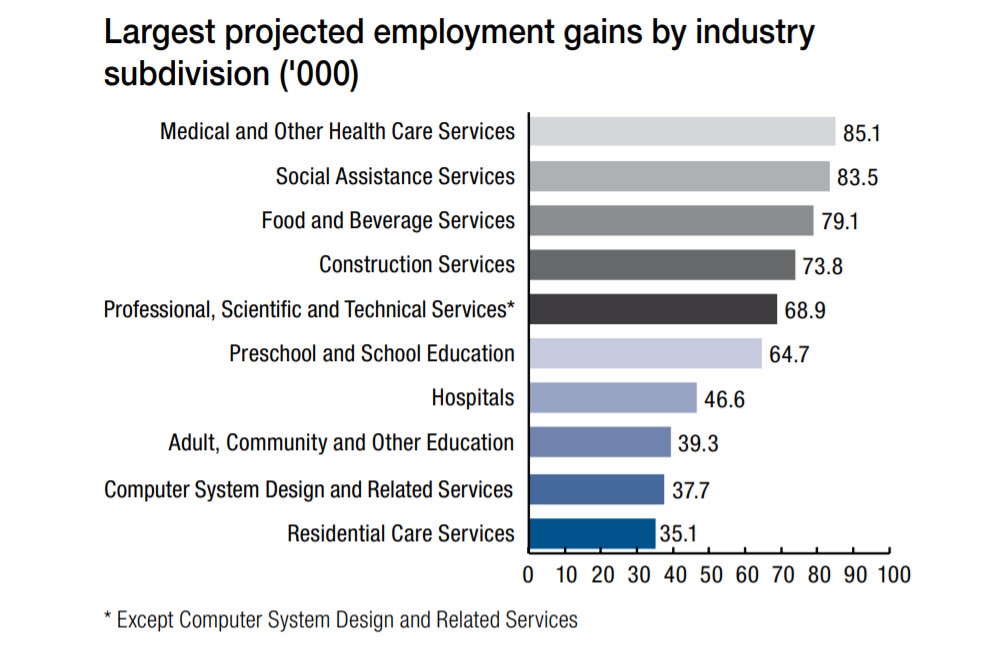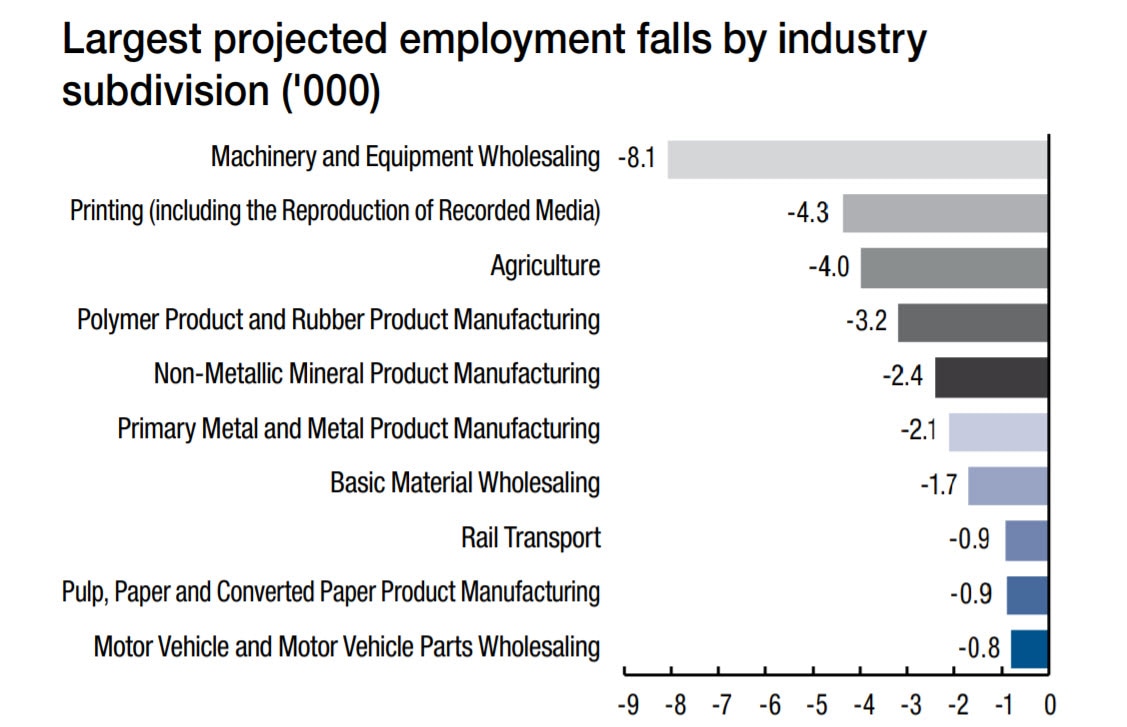Which industries will create the most jobs in the coming five years? Take a look at the industries predicted to create most jobs in Australia according to the Department of Employment, Skills, Small and Family Business.
According to the Australian Jobs report, Department of Employment, Skills, Small and Family Business’s annual publication about the Australian labour market there has been a significant shift away from medium-skill jobs towards higher-skill jobs in last two decades and a decline in lower-skill jobs.
The report states having the ‘ability to gain new skills and apply existing skills to new contexts will be critical to success in the changing labour market’.
A recent survey by the World Economic Forum found employers thought that, by 2022, more than half of all current employees would require significant reskilling or upskilling.
“Interestingly, the majority of employment growth over the past five years has been in occupations that generally require post-school qualifications.
“This is a long-term trend that is expected to continue, with the vast majority of jobs growth over the next five years projected to be in higher-skilled occupations,” Labour market analyst Ivan Neville said.
With the job market continuously evolving, here’s a look at the industries that will create maximum new jobs or see large falls in employment in Australia in the next five years.
Industries that will see maximum job creation:
According to the Department of Employment, Skills, Small and Family Business, most new jobs will be created in four specific industries - Health Care and Social Assistance, Construction, Education and Training and Professional, Scientific and Technical Services.
‘Health Care and Social Assistance industry is projected to have the strongest employment growth of any industry over the five years to May 2023,’ says the Australian Jobs report.
The top employing occupations in this industry are registered nurses, aged and disabled carers, child carers, nursing support and personal care workers and receptionists.
Construction industry which employs carpenters and joiners, electricians, construction managers, plumbers, is projected to have above-average employment growth over the five years to May 2023.
Education and Training employment is projected to increase strongly over the five years to May 2023, influenced by growth in the school-aged population, continued strength in international education and the growing demand for adult and community education.
There will be a great demand for primary and secondary school teachers, education aides, University lecturers and tutors.
The demand for highly educated workers like accountants, software and applications programmers, solicitors, graphic and web designers who come in the Professional, Scientific and Technical Services industry category is too projected to increase strongly over the five years to 2023.
Industries that will see a big decline in jobs:
Machinery and Equipment Wholesaling, Printing, Agriculture, Polymer Product and Rubber Product Manufacturing and Non-Metallic Mineral Product Manufacturing will see a big decline in employment prospects.
Employment is projected to fall in Wholesale Trade (down by 9,700, or 2.7%) and Agriculture, Forestry and Fishing (1,400, or 0.4%).
The 10 industry subdivisions that are projected to record the largest falls in employment include some in Wholesale Trade and Agriculture, Forestry and Fishing but, notably, employment in a number of manufacturing subsectors is also projected to fall.
‘Not just technical skills but need to be a whole package’
Melbourne-based career coach, Naishadh Gadani says the latest data is in sync with the trends seen now.
“It is mostly driven by population growth and the growing number of seniors in our country. Health Care and Social Assistance is creating a lot of jobs right now and will continue to grow in the next five years. With a booming population, we need more hospitals and medical staff and with an increased focus on aged-care and the National Disability Insurance Scheme (NDIS), there is a big demand for aged-care workers and disability carers,” Mr Gadani told SBS Hindi.
Mr Gadani says the demand for school teachers and university lecturers too will continue in the next five years due to the population boom in big cities.
“Population growth means we need more schools and therefore this report rightly points out that primary and secondary school teachers, as well as university lecturers, will be in great demand in the next five years.
But it is not just technical skills that will land you the role, says labour market analyst Ivan Neville.
Mr Neville noted that the jobs market is highly competitive and employers are not just looking for people with technical skills but for people who have the ‘whole package’.
“In addition to education and experience, employers increasingly value staff who have employability skills — which includes personal and people skills, a good work ethic and the ability to work in a team.”



Post a Comment
Contact us at graduateaustralia@gmail.com to start your application today!